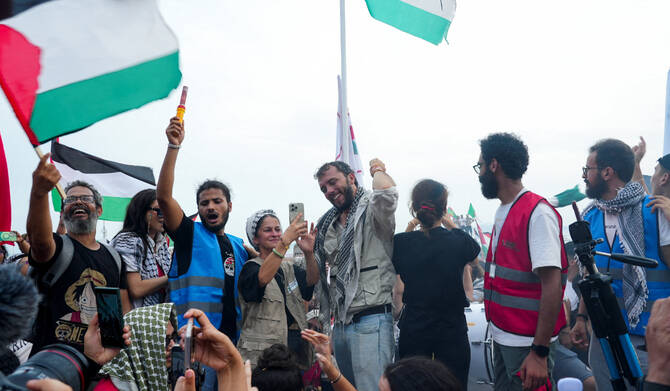JERUSALEM: Aid workers in the Palestinian territories told AFP they are concerned that rules recently floated by Israel could make already difficult humanitarian work “almost impossible.”
Since the war in Gaza broke out with Hamas’s October 7, 2023 attack on Israel, aid organizations have been contending with a “slippery slope” when it comes to Israeli authorities’ tolerance for their work, said one senior NGO staffer.
But after COGAT, the Israeli body responsible for overseeing Palestinian affairs, presented a plan last month for reorganizing aid distribution, that slope has gotten “much steeper,” with some NGOs deeming the proposed changes unacceptable, she added.
COGAT did not respond to AFP’s request for comment.
The staffer and others interviewed requested anonymity for fear of repercussions for their operations in the occupied West Bank and the besieged Gaza Strip, where responding to the acute humanitarian crisis brought on by the war had already been a Herculean undertaking.
“The ability to deliver aid and adhere to humanitarian principles in Gaza, the access restrictions we’re facing in the West Bank... All of these things, when you put them together, you just feel like you’re watching the apocalypse,” she said.
“We basically have a fire extinguisher trying to put out a nuclear bomb.”
According to NGOs, COGAT presented a plan at the end of February that aims to reinforce Israeli oversight of aid by establishing logistics centers linked to the army and by enforcing tighter control over the entire humanitarian supply chain.
“Logistically, it will be almost impossible,” said one member of a medical NGO, wondering whether such organizations would be forced to declare individual recipients of various medications.
COGAT’s stated objective, according to the NGOs, is to combat looting and the misappropriation of aid by militants.
But the NGOs say they believe looting is currently marginal, and that the best way of avoiding it is to step up deliveries.
Israel, meanwhile, cut off aid deliveries to Gaza entirely early this month over an impasse with Hamas on how to proceed with a fragile ceasefire.
“The thinking (of COGAT) was that Hamas would rebuild itself thanks to humanitarian aid,” said a representative of a European NGO, “but that’s false, and humanitarian aid won’t bring them rockets or missiles.”
Israel “just wants more control over this territory,” he added.
The NGOs said COGAT did not specify when the new rules would take effect.
A separate government directive that came into force in March established a new, stricter framework for registering NGOs working with Palestinians.
It requires organizations to share extensive information on their staff, and gives the government the right to reject employees it deems to be linked to the “delegitimization” of Israel.
NGOs operating in the Palestinian territories already face numerous difficulties, and even outright danger, particularly in Gaza.
At least 387 employees have been killed in Gaza since the start of the war, according to a recent UN estimate.
Philippe Lazzarini, head of the UN’s Palestinian refugee agency UNRWA, which was recently banned from operating in Israel, said the humanitarian community is wondering “how far can we go while remaining principled,” and at what point that would no longer be the case under the new rules.
Amjad Shawa, director of the Palestinian NGO network PNGO, said organizations “need to all work against” the new restrictions, adding that he believed the rules’ actual goal was to “prevent accountability and any kind of criticism on Israel toward what they committed” in Gaza and the West Bank.
“Lives are at stake,” he added.
The head of an international NGO agreed that a “red line has been crossed and I think we should oppose it.”
But one humanitarian in the medical sector said a principled stand would only draw flak from the Israelis, and “given the needs (of the Palestinians), principled positions don’t hold water.”
NGOs fear new rules will make helping Palestinians ‘almost impossible’
https://arab.news/53zk4
NGOs fear new rules will make helping Palestinians ‘almost impossible’

- Since the war in Gaza broke out, aid organizations have been contending with a ‘slippery slope’ when it comes to Israeli authorities’ tolerance for their work
- COGAT, the Israeli body responsible for overseeing Palestinian affairs, presented a plan last month for reorganizing aid distribution
Pro-Palestinian flotilla announces new mission to Gaza

- Israel controls Gaza's borders and scrutinises all aid coming into the territory
TUNIS: A flotilla of pro-Palestinian activists who attempted to reach Gaza last year will set sail for the besieged territory again next month, one member told AFP on Friday.
The Global Sumud Flotilla said the new mission set for March 29 would be "the largest coordinated humanitarian intervention for Palestine in history" and will mobilise "thousands from over 100 countries".
"We will be sailing from Barcelona, Tunis, Italy and many other ports not yet made public," Brazilian activist Thiago Avila told AFP.
The group said an overland convoy would also leave for Gaza on the same day, without specifying from where.
The campaigners sought to break an Israeli blockade by delivering aid to Gaza by sea last October, before they were intercepted by Israel, detained and deported.
Israel controls Gaza's borders and scrutinises all aid coming into the territory.
The activists describe their actions as a "non-violent response to genocide, siege, mass starvation, and the destruction of civilian life in Gaza".














